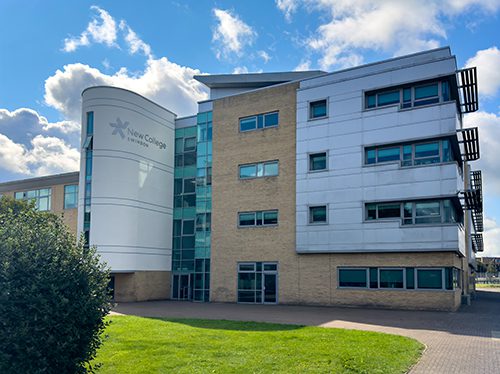Student Information
New College Swindon is a registered provider on the Office for Students (OfS) Register of higher education providers in England. This means we meet the OfS requirements for course quality, academic standards, student support, student protection and more. Being registered means we have demonstrated to the OfS that New College Swindon:
- provides well-designed courses that deliver a high-quality academic experience for all students
- supports students from admission through to completion
- ensures student’s outcomes are valued by employers or enable further study
- awards qualifications that hold their value over time, in line with recognised standards
- pays regard to guidance about how to comply with consumer protection law
- has a published student protection plan setting out the risks of course, campus or provider closure and how it will protect students’ interests in such an event
- has the financial resources to provide and deliver the courses advertised
- has the management and governance arrangements necessary to provide and deliver the courses advertised.
|
|
Find out more
|
Student Protection Plan
All higher education institutions registered with the OfS are required to publish a Student Protection Plan setting out what students can expect to happen should a course, campus or institution close.
|
|
Student Protection Plan
|
Access and Participation Statement
Access and participation plans set out how higher education providers will improve equality of opportunity for underrepresented groups to access, succeed in and progress from higher education.
|
|
Access and Participation Statement
|
Transparency Tables
The information published below shows:
- The number of applications for admission on to recognised, undergraduate higher education courses that we have received from the UK domiciled applicants
- The number of offers we have made in relation to those applications
- The number of those offers accepted and the number of those who have registered with us
- The number of students who attained a particular degree or other academic award, or a particular level of such an award, on completion of their course with us.
It also shows these numbers by reference to:
- The gender of the individuals to which they relate
- Their ethnicity
- Their socio-economic background
It is important to note that the data presented has not been contextualised. This means, for example, that you will not be able to see from this data how many of those applying to courses met the entry criteria. It is also the case that universities and colleges will often receive many more applications than they have spaces on courses and so offer rates will necessarily be lower than application rates in those circumstances.
|
|
2021 Transparency Tables for New College Swindon
|
APL/APEL Information
Entry with Credit or Prior Learning Experience
You may have studied elsewhere for all or part of a qualification and wish to progress or complete your study at New College Swindon University Centre. There are two terms which define these possibilities Accredited Prior Learning, and Accredited Prior Experiential Learning.
This is a way of gaining access or ‘direct entry’ to a course using previous learning, which has been certificated or for courses partially completed, that credits have been or will be awarded before entry.
To accept applicants we will need to see an official transcript of results. Generally, to enter directly into a programme, the programme you had studied previously should be very similar to the course you wish to study here.
The following conditions would also apply:
- Level 5 entry (year two of a degree or HND programme): requires you to have gained 120 credits at Level 4.
- Level 6 entry (year three of a degree*) requires you to have gained 240 credits at Level 5. This is subject to the awarding university regulations on APL.
*entry to a defined one-year ‘top up’ programme may not require APL unless the previous course studied is not sufficiently comparable to the level 5 programme offered here.
Where Modules differ between the course previously studied and the course you wish to enter, a ‘mapping’ exercise will need to be undertaken. You will provide us with the Module Descriptors detailing your Learning Outcomes, which are usually provided in a course Handbook or online. Academic staff will then determine if our course compares to the course you have done or are currently doing, and if they are satisfied, we will consider your application. If we recognise gaps in your learning through the mapping process, we may require you to do additional work to bridge the gap/s before joining the course.
In cases where you studied some time ago or your qualification is out of date, we may not be able to accept you with APL. This is because courses change over time and we may have the necessary information to conduct adequate mapping, or your prior knowledge may not be sufficient to meet current professional standards.
In all cases, we must be assured that you have the same knowledge as students studying the whole course with us, and are therefore fully prepared for the next academic level and subject areas, and will not be disadvantaged in any way by transferring to our course.
Oxford Brookes University information on Accreditation of Prior Learning can be found here.
This includes knowledge and skills gained through other experiences such as working, volunteering or interests. It can also be used to demonstrate that you already have the skills and knowledge for a particular module or unit of study, and if evidenced sufficiently, can allow exemption of that particular module or unit.
Generally, this process can take some time, so it is advisable to contact us well in advance if you intend to gain APEL. We will require evidence from you of the learning that has taken place in the workplace or through relevant activities which demonstrate that your knowledge and skills are comparable to students who have undertaken the unit/module for which you are seeking credit or exemption.
In most cases, this will involve a professional portfolio of evidence, workplace projects, and evidence of CPD such as short courses, or work-related training.
It is worth noting that this evidence must be substantial to allow exemption and a thorough assessment of the evidence will need to take place to ensure this maps to the learning outcomes of the module in question. You need to consider carefully whether this evidence is readily available and sufficient for your APEL application.
To apply using APL or APEL you will need to contact our HE Admissions coordinator. You will be advised on how to apply through www.ucas.com to ensure that you select your Point of Entry as year 2 or 3 as appropriate. They will also advise you on how to progress your APL/APEL application, provide advice on submitting evidence and may put you in contact with an appropriate academic tutor.
In all cases we will need a Certificate and/or transcript of your results from your previous institution along with your application. For international qualifications, it is the applicant’s responsibility to gain a statement of comparability from NARIC prior to application. We recognise that when you apply, transcripts of results may not yet be available, and so once we confirm that the mapping of learning outcomes has been successful, we may then make a conditional offer subject to receipt of your Certificate/transcript of results. This should include the module titles, marks and grades, and the number and level of academic credits gained for each module.
The tuition fees that you will be charged will be assessed on an individual basis and will be dependent on the number of modules/units to be studied, your previous qualification and dates of study. In some cases other requirements will need to be met prior to entry. You may need to demonstrate that you have met professional standards such as those required for teaching practice placements and any non-contributory elements in terms of credit, which must be passed.
For any courses that involve a placement, such as Health and Social Care, you will need occupational health clearance and Disclosure and Barring Service (DBS) background clearance prior to registration.
Status
New College is a charity, but we do not have a charity number as a Further Education Corporation we are an exempt charity as defined in Part 3 of the Charities Act 2011.
The act is here:
|
|
https://www.legislation.gov.uk/ukpga/2011/25/part/3
|
Paragraph 22 (1): In this Act “exempt charity” means any institution, so far as it is a charity, that is within Schedule 3.
Schedule 3 (7): A further education corporation.



27-35 Fleet Street
Swindon SN1 1RQ












